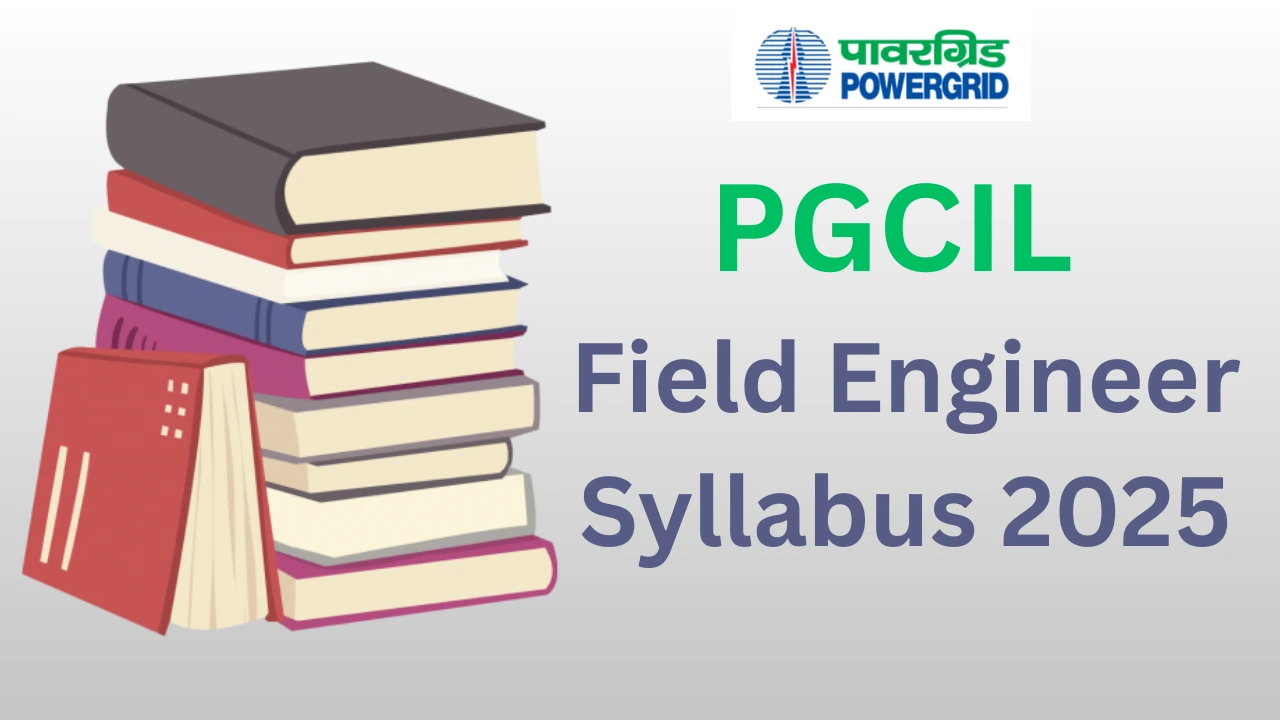PGCIL Field Engineer Syllabus 2025 : The Power Grid Corporation of India Limited (PGCIL) has officially released the Field Engineer Syllabus 2025 along with the updated exam pattern. Candidates preparing for the PGCIL Field Engineer Recruitment 2025 must go through the detailed syllabus and exam structure carefully to plan their preparation effectively. In this article, we will cover the exam pattern, subject-wise syllabus, preparation tips, and direct PDF download link for your convenience.
Table of Contents
PGCIL Field Engineer Syllabus 2025 – Overview
PGCIL Field Engineer Syllabus 2025 Before starting your preparation, it’s important to understand the exam structure and recruitment details. Below is a quick overview of the PGCIL Field Engineer Exam 2025:
| Particulars | Details |
|---|---|
| Exam Name | PGCIL Field Engineer Recruitment 2025 |
| Conducting Authority | Power Grid Corporation of India Limited (PGCIL) |
| Number of Vacancies | 730 |
| Selection Process | Written Exam + Interview |
| Total Questions | 75 |
| Total Marks | 75 |
| Exam Duration | 1 Hour |
| Negative Marking | No Negative Marking |
| Official Website | powergrid.in |
The exam will be conducted in online mode with multiple-choice questions (MCQs). Each correct answer carries 1 mark, and there is no penalty for wrong answers, which gives candidates a better chance to attempt all questions.
PGCIL Field Engineer Exam Pattern 2025
PGCIL Field Engineer Syllabus 2025 : The written test is divided into two main sections:
- Technical Subjects (Branch-Specific) – Questions related to Electrical Engineering or Civil Engineering, depending on the candidate’s applied discipline.
- Non-Technical Subjects (General Aptitude, Reasoning, Numerical Ability, English, and General Awareness).
- Total Questions: 75
- Total Marks: 75
- Duration: 60 minutes
Candidates who qualify in the written test will be called for the interview round.
PGCIL Field Engineer Syllabus 2025 – Subject-Wise
PGCIL Field Engineer Syllabus 2025 : The official syllabus covers both technical (core engineering) and general aptitude subjects. Let’s break it down section-wise:
1. Technical Subjects
(A) Electrical Engineering
- Basic Electrical Concepts
- AC Fundamentals
- Network Theory
- Electrical Machines
- Power Systems
- Electrical Drives
- Power Electronics
- Estimation & Costing
- Control Systems
- Measurements & Instrumentation
(B) Civil Engineering
- Structural Engineering
- Geotechnical Engineering
- Surveying
- Construction Management
- Hydraulics & Fluid Mechanics
- Water Resources Engineering
- Transportation Engineering
- Environmental Engineering
2. General Aptitude
(A) Logical Reasoning
- Syllogism
- Classification
- Coding–Decoding
- Direction Sense
- Series Completion
- Input–Output
- Blood Relations
- Seating Arrangements
- Analytical Puzzles
(B) Numerical Ability
- Number Systems
- Decimals & Fractions
- Ratio & Proportion
- HCF & LCM
- Percentages
- Time & Work
- Time & Distance
- Averages
- Profit & Loss
- Simple & Compound Interest
- Mensuration (2D & 3D Geometry)
(C) English Language
- Basic Grammar
- Vocabulary
- Reading Comprehension
- Sentence Completion
(D) General Awareness
- Current Affairs (National & International)
- Indian Power Sector Awareness
- Basic Computer Knowledge
How to Download PGCIL Field Engineer Syllabus PDF 2025
PGCIL Field Engineer Syllabus 2025 Candidates can directly download the official syllabus PDF released by PGCIL. The document includes detailed topics for both technical and non-technical sections.
Click Here to Download PGCIL Field Engineer Syllabus PDF 2025
PGCIL Field Engineer Preparation Tips 2025
PGCIL Field Engineer Syllabus 2025 Preparing for a competitive exam like PGCIL Field Engineer requires proper planning and consistent effort. Here are some expert preparation tips:
- Understand the Exam Pattern & Syllabus
- Go through the official syllabus in detail.
- Focus on important technical subjects first, as they carry maximum weightage.
- Create a Study Schedule
- Divide your time between technical and general subjects.
- Dedicate at least 3–4 hours daily for core engineering topics.
- Refer to Standard Books & Study Materials
- Use recommended textbooks such as Electrical Engineering by JB Gupta, Civil Engineering by R. Agor, and aptitude books like RS Aggarwal Quantitative Aptitude.
- Practice Previous Year Papers & Mock Tests
- Solving past papers will help you understand question trends.
- Take online mock tests to improve time management and accuracy.
- Focus on Conceptual Clarity
- Instead of rote learning, build strong fundamentals.
- Revise formulas, theorems, and engineering concepts regularly.
- Stay Updated with Current Affairs
- Read daily newspapers and follow reliable online sources.
- Focus especially on power sector news and government energy policies.
- Work on Speed & Accuracy
- Since the exam duration is only 1 hour, practice quick calculations.
- Use shortcuts for reasoning and numerical ability questions.
- Healthy Lifestyle & Positive Mindset
- Take proper rest, eat healthy, and exercise to maintain focus.
- Stay motivated and confident throughout your preparation journey.

